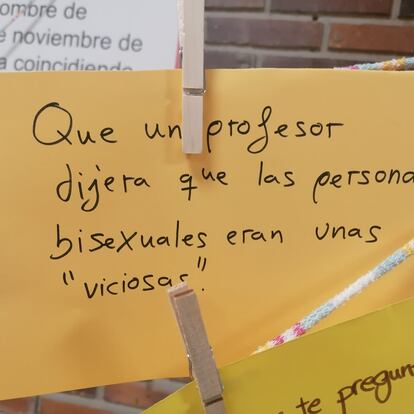The Complutense avoids making public cases of harassment in its bosom for years | Spain

The scandal of the university professor and founder of Podemos Juan Carlos Monederoaccused a month ago by several women for abuse and sexual harassment has highlighted the opacity with which the Complutense University of Madrid (UCM) where he teaches class treats cases of harassment that are denounced within their bosom. The Madrid campus has answered with reluctance – and with partial and incomplete data – to the requests for information of this newspaper about the complaints it has managed in the last decade.
The Complutense has changed their strategy (and speech) in the last 20 days to reveal the requested information, from hiding in the Personal Data Protection Law to hang on its website last Monday afternoon a PDF where it reveals that since 2022 has managed 27 complaints for sexual harassment, 14 of them to teachers. But it rejects informing of the cases known since 2016, the result of the research and the number of teachers issued.
This practice contravenes the protocols of the General State Administration and the transparency recommendations of the experts in gender studies, which indicates that the knowledge of these behaviors can encourage other victims to denounce those who have suffered.
The tsamot, which began with the publication of ABC and eldiario.es With the first testimonies of Cardero’s complainants, he has also uncovered the ineffectiveness with which we can handle the matter – he did not open an internal investigation on his own because the victims did not want to continue with the process and affirms that he pushed the professor from the activities of the party, but without communicating the reasons and without quoting him to listen to his version, as his anti -abuse protocol points out.
That tsunami arrived at the Complutense, who later advanced to El País on February 20 who investigated a complaint of a student of the Complutense against Monedero of course sexual harassment. Since then, the Campus has raised a wall of silence and has maneuvered to cover the cracks of its anti -racious system. At first, the Complutense was shielded by the questions of this newspaper in the Personal Data Protection Law to avoid providing any information.
The relice of the university to give data are constant. This newspaper asked for the first time on February 27 and the University sent to the memories of the Campus equality unit, responsible for managing complaints. At that time, only those of the last three academic courses were published on the web: to the 2023-2024 one could not access and that of the others did not contain any data. Asked about this, the campus did not answer until a week later, sent a link with the PDF of the memory of the 23-24 course that was not accessible (with the creation date of February 28, a day after requesting the questions) that only contained references to the number of people served.
The document indicates that in the last year 89 people contacted the unit of equality, of which seven of them decided to « activate » the protocol, in addition to 18 other students who had previously contacted the entity and continued to receive attention. « A total of 21 people were referred to resources that are part of the Comprehensive Care Network for Gender Violence and other centers, including the Crisis Center in the Community of Madrid, the municipal point of the Regional Observatory of Gender Violence (different districts) or the program attends to the Gregorio Marañón University Hospital, » the document collects.
When asked about specific data (date of complaints, facts, number of accused professors, faculties …), the UCM justified to keep them hidden by those data « because it would violate the right to privacy and data protection. » But the truth is that it is not so, since numerous organizations report on the cases of abuse and sexual harassment that manage, in general. And the UCM student himself recounts in his annual memories the content of the complaints that come on other academic issues, although he omits complaints about harassment. On this issue, the Complutense is constant in its policy of not offering details, even general about these cases. A year ago he already partially informed this newspaper about the number of complaints of the 2023-2024 course for a report For a podcast today in the country, although without specifying how many of the defendants were teachers and what had been the results of the research.
And, on the other hand, the Campus – according to its criteria – would have then skipped the aforementioned Data Protection Law by notifying the press against the purse. Along these lines, for the elaboration of this article and before the publications of some media where students and teachers claim that they officially complained in the past before the behaviors of the founder of Podemos, the University has responded to El País that “in the unit of equality no complaint was filed since this government team is”, and concludes: “In 2016 we do not know if complaints were filed, but there is no documentary. There is no record of those facts.
Finally, on Monday 17 in the afternoon, four hours after this newspaper insisted on its request, it changed their strategy and hung on its website a PDF document, signed by the delegate of the Equality Unit, Isabel Tajahuerce, where she reveals that since 2022 she has tried 27 complaints only of sexual harassment, and that 14 of the defendants are teachers, although she does not give information about the result of internal research.
This opaque procedure collides with the transparency policies recommended by experts in sexist and institutional violence, such as the academic Sara Ahmed. « When a story is known, many others can be known, » says Ahmed. In the same way, it does it against the Transparency and Good Government Law, which points out that « only when the action of public leaders undergoes scrutiny, when citizens can know how the decisions that affect them are made. »
It also clashes with the guidelines that the university published six years ago, where it stressed: « Data and gender data will be available annually about cases and interventions of different cases of harassment. The publication of these data will be done at all times the anonymity of the people involved and with the maximum professionalism. » The campus should have published that information at least until April 2022, When you approved an update of the documentwhere he suppressed that paragraph. This newspaper has not found a trace of those publications.
The Government approved in March 2024 a royal decree with a protocol in the scope of the General State Administration and its public bodies, where public universities are integrated, in which they indicate that they will send annually to the General Directorate of the Public Function a memory on cases of sexual harass of sexual harassment or harassment due to sex;
Opacity is one of the conclusions that the political scientist and doctor in gender studies, Paula Martín Peláez, extracted in her thesis Sexual, sexist and LGTBIQFóbic harassment at the Complutense University of Madrid. In it, presented in May last year, Marín Peláez interviewed 28 victims and witnesses of harassment in the university field (sexual harassment, sexual assault, harassment, bifobia, lesfobia, transphobia, gender violence …). The majority of the defendants are teachers (13, two of them teaching and researcher personnel), who are followed by an administrative worker or services, a priest and a security guard.
Only 11 came to the Equality Unit, and in most of those occasions the case did not prosper or the complainants of the results were not informed. « In cases where some institutional channel was activated, in most of them, there was no response from the university, which points to the inaction by the Complutense in cases of harassment, » says the political scientist in her analysis of the interviews. After presenting the thesis, the Complutense did not call the doctor to ask for information both for the victims who denounced and were not treated and for those who did not. The UCM first affirmed to this newspaper that it is « the thesis of a person, based only on his opinion », but two hours later he said of those statements and responded with « an official position »: « It is important to point out that the data in it are anonymous, so that the university does not have access to the identity of the referred people. Consequently, it is not possible to initiate any action without a formal complaint. »
On the other hand, the expert, who also founded the violet point of Somosaguas, reports that the university has other tools to investigate cases of harassment, such as opening a reserved information procedure. « The university has these mechanisms, because they are the same that facilitates the administrative procedure. What happens is that it is not interested in taking it out. In cases where there were rumors, the university can open an information procedure reserved to clarify the facts without the need for a complaint, » says the doctor, who, however, recalls that if this process opens in the end, a victim must ratify it: « They cannot skip the victim. There is a victim to say. » The university does not want to report this data.
Martín Peláez also recalls that not all victims go to the Equality Unit to report their case, most of the time they do not denounce “due to the lack of institutional confidence”. However, he adds that, the people, who also denounce it before the quality commission of each faculty, to the student defender or directly to the different cloisters. « Most of the time they are nothing left, » says the political scientist. When the UCM is insistently asked by the records of complaints or complaints in the organisms other than the Equality Unit, it only replies: « They will then have it in the Transparency Portal. Which are responsible for that information. »








